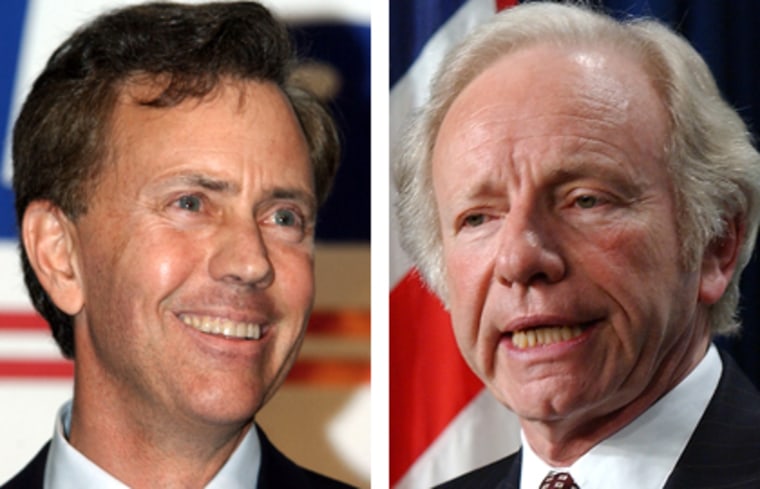WEST HARTFORD, Conn. - Having gone from being a national Democratic hero six years ago to just another job holder at risk of being forced into early retirement, Sen. Joe Lieberman faces a high-stakes debate Thursday night with his challenger in the Aug. 8 Connecticut Democratic primary, Ned Lamont.
The one-hour face-off will be simulcast live on MSNBC Cable and MSNBC.com, and in Connecticut on NBC affiliate WVIT in Hartford.
Lieberman is a seasoned debater, having squared off at least a half-dozen times against his rivals for the 2004 Democratic presidential nomination and having debated the Republican vice president nominee, Dick Cheney, in 2000.
Lamont, a former selectman (or council member) for the town of Greenwich, Conn., is the newbie when it comes to nationally televised debates.
Lamont’s great-grandfather was a partner of legendary financier J.P. Morgan. Gilt-edged though his background is, Lamont’s message is one of populist anger with Lieberman over his support for President Bush on the Iraq war, Lieberman's refusal to support a filibuster of Bush Supreme Court nominee Samuel Alito, and other stands that Lamont supporters see as too conservative.
Lamont is the vessel for frustrated Democrats across the nation. But the question is: are there enough of the disgruntled here in Connecticut to show up on Aug. 8 and oust the three-term senator?
A Lieberman candidacy ... one way or another
Lieberman announced over the July 4th holiday that he’ll declare his own independence, by running as a third choice on the November ballot, if he loses his party’s primary.
Lieberman said he needed an insurance policy against a low turnout for the primary, which will occur at a time when many voters will be vacationing.
According to the office of Secretary of State Susan Bysiewicz, there are about 653,000 active registered Democrats in the state.
Bysiewicz has estimated that a turnout of between 30 percent and 40 percent is possible in the Aug. 8 primary, due to the intense interest in the race.
The state also has nearly 930,000 unaffiliated voters. They have until noon on Aug. 7 to re-register as Democrats if they want to take part in the Lamont vs. Lieberman primary.
One of the unaffiliated voters who supports Lieberman and who was unaware she could vote in the Democratic primary if she re-registers is Alicia Wertheim, a retired nurse from West Hartford.
Wertheim and her husband have contributed $5,000 to Lieberman’s campaign.
“We just think he’s a great guy, so forthright, honest, level-headed,” Wertheim said Thursday. “He seems very down to earth.”
Wertheim said she had just heard that Lieberman is seeking signatures to get on the November ballot as an independent, if he loses the primary.
“An independent candidate — I like that,” she noted. “I’m registered as an independent. It’s sometimes better not to be associated with one party or the other.”
Voting on Iraq
But Lamont supporter Sten Westgard, a health care information technology consultant and a member of the Orange, Conn. Democratic Town Committee, sees the race quite differently.
“What do you do every night? I look at the casualty lists (from Iraq),” he said. “Do you think the Iraq war is important to me? You bet.”
Westgard’s cousin is serving in the National Guard in Iraq.
Even though Westgard voted twice for Lieberman in 2000, both for vice president and for the Senate, he began to be disturbed by the senator about a year ago. “If you were looking for someone who was going to criticize fellow Democrats, Lieberman was always first in line,” Westgard said.
And he predicted, “If Lieberman survives the election, he’ll be emboldened to ignore Democrats even more.”
The Lamont effort, which seemed more quixotic than a real threat to Lieberman back in February, has excited fervor among Democratic bloggers and Internet activists across the country.
Tim Tagaris, the former Internet outreach coordinator for the Democratic National Committee, who’s now doing web strategy for the Lamont campaign, explained Thursday why he joined the Lamont campaign, “There’s no other place to be right now. There are now tens of thousands, if not hundreds of thousands, of people online who are watching this race and watching the successes we’re having, and saying ‘we have a real opportunity to make a difference in the political process.’ And that’s inspiring.”
A liberal/conservative report card
While some Democrats see Lieberman as a conservative, the conservatives themselves don’t.
After all, Lieberman is decidedly liberal on gay rights — getting an 88 out of 100 rating from the Human Rights Campaign, the gay rights advocacy group, and an endorsement from the League of Conservation Voters, who called him “a top environmental leader in Congress, fighting every day for the environment, health, and quality of life of Connecticut families.”
The American Conservative Union (ACU), a leading right-wing vetting group, gives Lieberman a low 17 out of 100 lifetime conservative rating, putting him in the same ACU basement as Sen. Joe Biden, D- Del. and Senate Democratic Leader Harry Reid of Nevada.
But the left side of the Democratic Party has long had an animosity toward Lieberman, going back at least as far his September 1998 Senate floor speech calling Bill Clinton’s liaison with Monica Lewinsky “immoral” and “harmful” because of the affair’s effect on America’s children.
Left-wing columnist Robert Scheer complained that Lieberman had “betrayed Clinton at a time when the right-wing jackals could taste the president’s blood.”
When Al Gore picked Lieberman as his running mate in 2000, Scheer called Lieberman “a preening moralizer” and concluded that “Gore has managed to find a vice presidential nominee who is even duller and more sanctimonious than he is.”
None of this venom mattered to Connecticut voters in 2000: they elected Lieberman to a third term with 63 percent of the vote.
But that was long before the Iraq war, before Lieberman’s hawkish speeches connecting Iraq and terrorism, and before the rise of left-wing bloggers, who’ve helped drive Lamont’s fund-raising.
